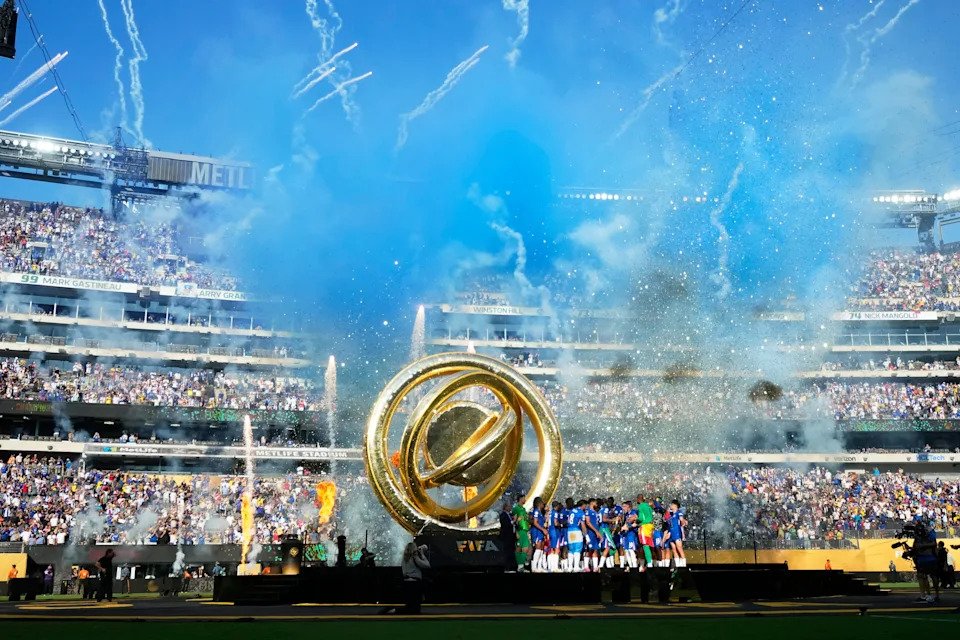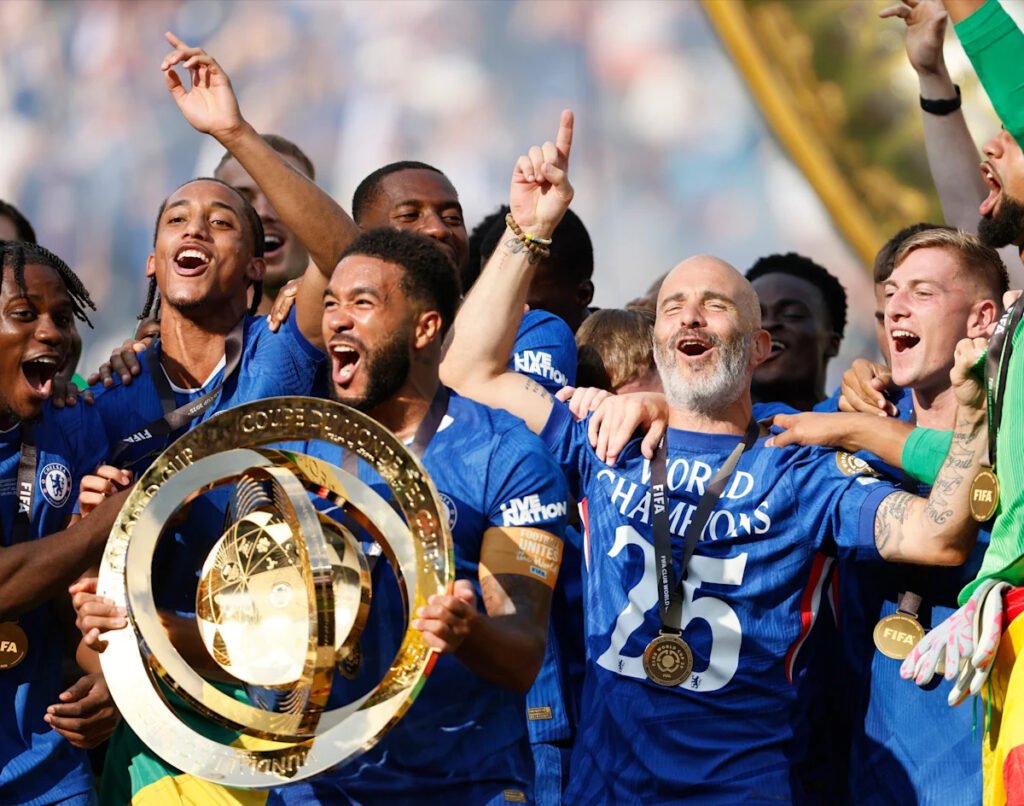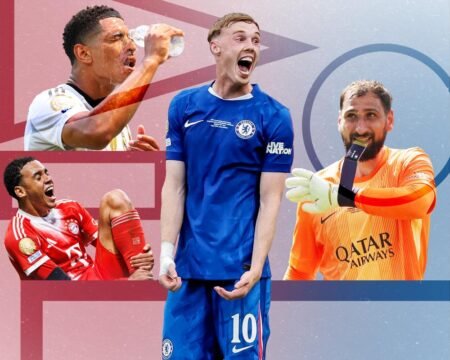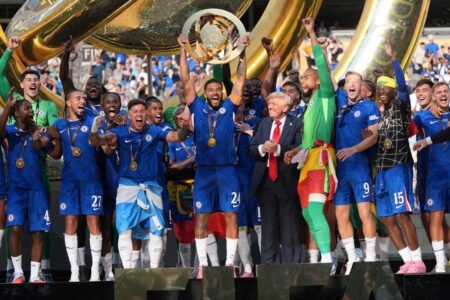EAST RUTHERFORD, N.J. — The winners walked onstage past a trophy designed to represent “the pinnacle of global club football.” They shook hands with the most powerful man in sports, then the most powerful man in the world. They partied beneath fireworks and flames, amid golden sparks and blue smoke. They, Chelsea, were “winners of the 2025 Club World Cup,” a PA announcer boomed, “and the new undisputed champions of the world!”
But back in London, their home, no trophy parade is planned.
Advertisement
And here at MetLife Stadium, even Chelsea players downplayed or resisted the notion that Sunday’s triumph over PSG put them atop global soccer.
“I think that’s a big statement,” captain Reece James said Friday, in advance of the final. “If we win on Sunday, we were probably the best team on the day; does it make us the best team in Europe? I’m not sure. We’re striving to get there. Whether one game decides that, that’s probably up to you to decide.”
Two days later, having routed PSG, James stood by that statement; and British reporters seemed to have decided. Their first two questions for James were forward-looking, about the implications of this Club World Cup title for the 2025-26 English Premier League and UEFA Champions League.
“For sure, we are headed in the right direction,” James said. But he seemed to agree: Sunday wasn’t a coronation.
Advertisement
“I’m happy with how much the club has progressed,” he said. “And I hope next season we’re competing in the Premier League to win the title, and competing to go far in the Champions League as well.”
It was “a huge step in the right direction,” and a “statement,” James assured. It was a “top achievement,” his head coach, Enzo Maresca, said. “It’s something that we ought to be proud of.”
But was it as significant as victory in the Premier League or Champions League, two competitions steeped in decades of history and prestige?
Maresca said he told his players: “I [have a] feeling that this competition will become just as important, or even more important, than the Champions League.”
Advertisement
The unsaid context: For now, it is not.
Chelsea captain Reece James, alongside coach Enzo Maresca, raises the Club World Cup trophy — a historic title, if not without complications. (Photo by Richard Sellers/Sportsphoto/Allstar via Getty Images)
(Richard Sellers/Allstar via Getty Images)
FIFA has tried to hype it and build it, instantaneously, into the sport’s premier club competition. Soccer’s global governing body commissioned what is likely the sport’s most expensive trophy, and granted Chelsea the “right” to wear a gold “WORLD CHAMPIONS” badge on uniforms for the next four years.
But the players? The ones who, ultimately, will decide how much this novel tournament means?
After some tempered celebrations, they sounded ready for a break.
At the final whistle, they bounded onto the field, spraying water into the air. After a post-match fight with PSG, they pranced toward fans for a fleeting moment. But there were no champagne showers, as there were a month earlier after Chelsea won the third-tier UEFA Conference League. There was no double-decker bus rolling through Manhattan, like the one that carried Argentina through Qatar in 2022. There was an awkward trophy lift with U.S. President Donald Trump, then some standard showers, and then?
Advertisement
A reporter asked James: What’s next?
“The first and only plan is to rest,” he said. “The season has been long. We’ve been playing for one year straight, since we started last preseason, and we know next year’s gonna be tougher, harder competitions. We want to compete and win more big trophies.”
The problems with FIFA’s grand idea
FIFA’s idea, of course, was that this would be the biggest trophy, awarded to a champion among champions of Champions Leagues. It is, in some ways, the natural next step in the globalization of club soccer. A century ago, there were only national competitions. Seven decades ago, the winners of those national competitions formed continental competitions. With air travel now ubiquitous, an intercontinental competition seemed overdue.
Advertisement
But when FIFA president Gianni Infantino rammed through resistance to birth his brainchild, the Club World Cup, he encountered three key hurdles or problems.
One is the undisputed preeminence of the European Champions League. With a vast majority of soccer’s wealth now concentrated there, hardly anyone feels a need to re-confirm that Europe’s top team is the world’s top team. Maresca implicitly reinforced that point on Sunday. Even after toppling PSG, he reiterated: “I consider them the best team in the world.”

Chelsea FC players lifts the FIFA Club World Cup trophy after the FIFA Club World Cup 2025 final match between Chelsea FC and Paris Saint-Germain at MetLife Stadium on July 13, 2025 in East Rutherford, United States. (Photo by Jose Breton/Pics Action/NurPhoto via Getty Images)
(NurPhoto via Getty Images)
They’re the best because, in the 2024-25 Champions League, they surged through three home-and-away series, ousting the top two teams in the world’s toughest league, Liverpool and Arsenal. (They also beat the third- and fifth-best teams in England, Manchester City and Aston Villa.) That, many would agree, is a more appropriate gage of strength than four single-elimination games at the end of a grueling season in dizzying heat on shoddy pitches in America — especially if three of the four games are against Benfica, Palmeiras and Fluminense.
Advertisement
“We probably got a little bit of luck with the draws,” James admitted.
PSG, on the other hand, won everything there was to win in France and Europe. It won the Champions League final by a historic margin. Sunday’s loss, captain Marquinhos said in Spanish, “doesn’t take anything away from the season we had up until now.”
Which leads us to the second problem: timelines.
PSG, by winning the 2025 Champions League in May, didn’t actually qualify for the 2025 Club World Cup; it qualified for the next edition, likely in 2029.
Chelsea, on the other hand, earned its place by winning the 2021 Champions League. Between then and now, it dipped to 12th place in the Premier League, and parted ways with all but one player from the 2021 title team. James is the only holdover. Maresca is the fifth head coach since then. Chelsea, if you were to construct a deserving field of 32 teams anytime in 2024 or 2025, would not have been invited.
Advertisement
The very logical idea underpinning the Club World Cup is that national leagues ladder up to continental Champions Leagues, which ladder up to this global summit. But the illogical reality is that many of the teams — not the clubs, the teams — who qualified for this 2025 tournament looked nothing like the teams who actually contested the 2025 tournament. Whereas a Champions League begins a few months after qualification ends, with the best and most deserving teams almost always involved, the Club World Cup felt like a somewhat random collection of participants.
And then there is the third problem, its place on the calendar. It felt, at times, like a perverted preseason tour. With the 2025-26 season around a month away, and the players deprived of a proper vacation, there was simply no time for an emotional climax.
“Just rest,” James said, “and look forward to next season.”
A trophy earned, a season compromised
The impact of this interminable season is the other unknown looming over the Club World Cup. Players clearly cared about it, but observers warned them. “Whoever wins it will be the worst winner of all time,” former Liverpool coach Jürgen Klopp said last month, “because they’ll have played all summer and then gone straight back into the league.”
Advertisement
Even as they chased this inaugural trophy and over $100 million in prize money, some of the European superclubs worried about the impact of the chase on their performance in next season’s Champions League and domestic league — two competitions their fans care more about. PSG plays Aug. 13. Chelsea hosts Crystal Palace on Aug. 17. Players, who are entitled to at least three weeks off, will either lack fitness when the season begins or risk burnout as it drones on through winter and spring.
Real Madrid, which lost in Wednesday’s semifinal and begins its 2025-26 season Aug. 19, reportedly petitioned La Liga to push back its opener. But the domestic leagues, which see FIFA’s Club World Cup as a threat, have no incentive to accommodate the tournament or the clubs who embrace it.
Advertisement
So there will be an inevitable crunch. If it stunts Chelsea and PSG in 2025-26, it might stunt or slow the Club World Cup’s growth, because big-time clubs might be less inclined to take it seriously.
Money, though, can almost always buy off problems. If FIFA can find the money, the Club World Cup will mature. And Chelsea, an otherwise forgettable team in 2024-25, will always be its inaugural winner. That seemed to be part of why Maresca saw its importance.
“We value it just as much as winning the Champions League,” he said. “Because we can give this championship to Chelsea fans, and it will be a source of pride to wear this badge.”
Read the full article here














